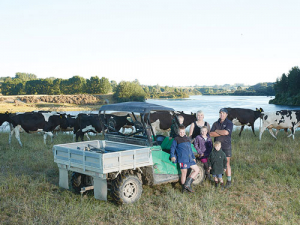The Clarkes milk 480 dairy cows including 100 autumn calvers, 100 calves and 100 heifers. They average about 190,000kgMS off the 480 cows per year.
They and their four children – Toby (11), Hayley (9), Harrison (5) and Blake (3) – love the farm lifestyle.
The Clarkes are dedicated to growing their herd of dairy cattle.
“I’m trying to breed a good herd of dairy cows that are healthy and efficient and put milk in the vat,” says Clarke. “That means good udder capacity and good general traits.”
They farm a mix of Friesian or Friesian-cross (80% Friesian genetics) on 280ha, some of it river flat and steep country.
They breed cows to suit their farm environment. “Stature is a big thing; we have a lot of steep country here so that suits a medium-sized cow better.
“I’m still in the shed every day so I also pay attention to a cow’s temperament. I want to milk a cow that not only has nice udders and is nice to look at, but is easy to work with.”
Clarke uses CRV Ambreed to improve the genetics and traits of the herd.
“I’ve been with CRV Ambreed since I first started sharemilking when I was 22. That’s 15 or 16 years I have been with CRV. I like their breeding philosophy and the type of cow they are chasing.” Clarke, who grew up in a farming family, has worked with CRV Ambreed field consultant Bill McLean who’s also a regional sales manager, and more recently Brett Andrews who is a field consultant for Cambridge, Tokoroa, Putaruru and Arapuni.
Longevity is important, and Clarke doesn’t cull cows based on age alone. “There are some cows that I should technically get rid of if I was going by age, but their udders are good, their feet are good, they are still milking well, so I keep them in the herd. Longevity is something I breed for.
“I don’t focus on breeding worth (BW); I focus on a healthy, solid cow with good traits and efficiency. In my opinion there is too much focus on BW. However, a lot of people out there do want the CRV Ambreed type of animal.”
Each year Clarke also nominates bulls; Clarke says being able to handpick which bulls mate with which cows means he can over time ensure a herd that’s consistent in feed, udders and size of animal.
The Clarke family feature on the front cover of the 2018 CRV Ambreed catalogue released in late March.
“It was good fun, taking photos with the family down by Lake Karapiro. Farming for us is a family affair, and my wife and children help out a lot on the farm, so it was nice to be featured on the catalogue together.”
CRV Ambreed sales and marketing manager Mathew Macfie says the Clarkes are excellent examples of farmers leading the way for the dairy industry in their philosophy and practices.
“Their cows are a good example of how breeding healthier, more efficient cows helps improve the farm business over time, given a long-term vision.”
CRV Ambreed recently started promoting its Better Life Health and Better Life Efficiency indexes to help farmers achieve a holistic approach to building their herds. The new style of index for sire selection has been brought in as a response to the changing needs of the New Zealand dairy industry.
















